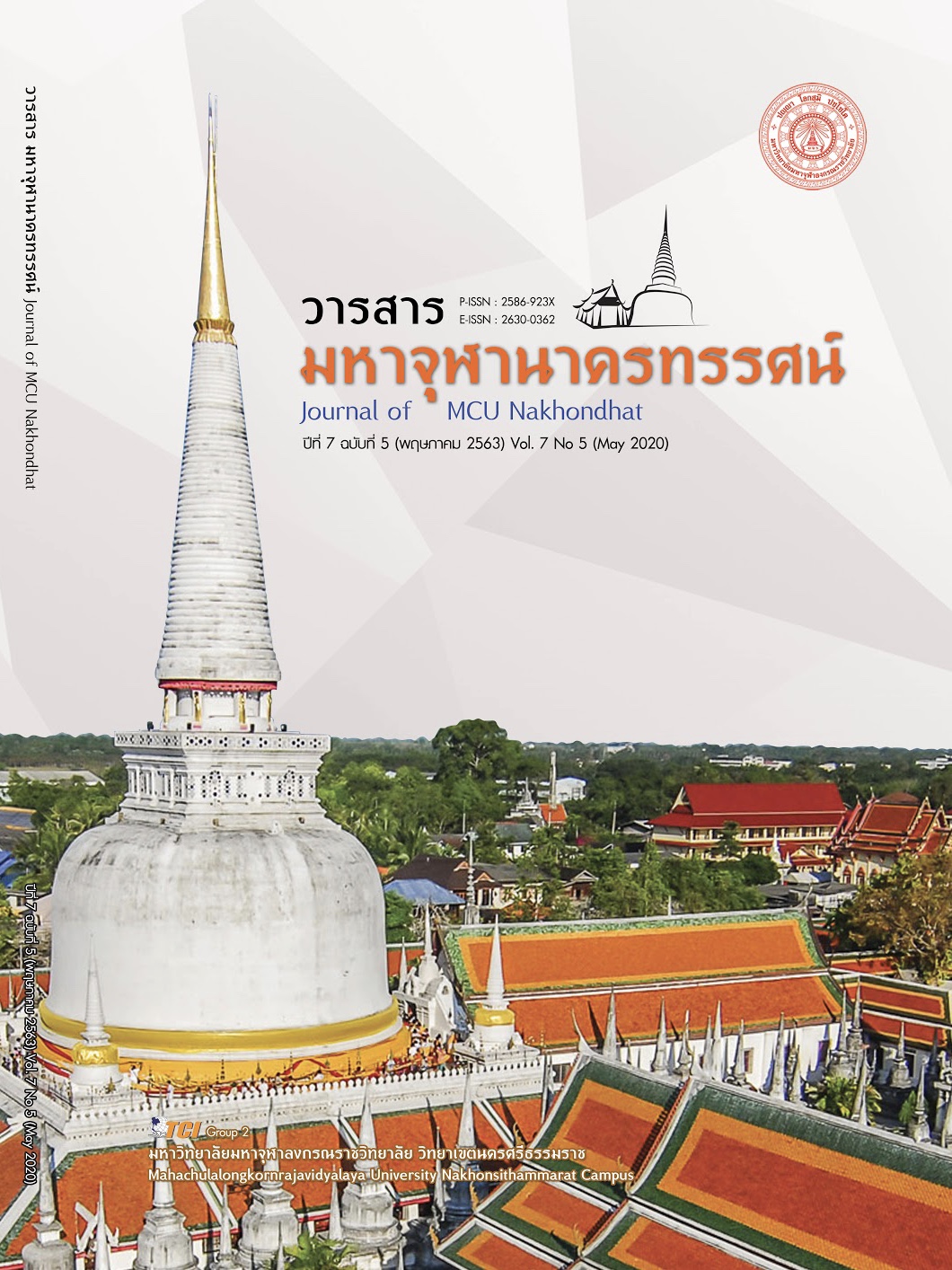THE RELATIONSHIP BETWEEN ETHICAL LEADERSHIP AND THE ROLE OF THE SCHOOL ADMINISTRATOR FOR DEVELOPMENT OF DESIRABLE CHARACTERISTICS OF STUDENTS IN SCHOOL UNDER NAKHON SAWAN PRIMARY EDUCATION SERVICE AREA OFFICE 1
Main Article Content
Abstract
This article to study the relationship between ethical leadership and the role of the school administrators for development of desirable characteristics of students. The aimed to 1) study the level of ethical leadership of school administrators; 2) study the level of role of the school administrators for development of desirable characteristics of students; and 3) the relationship between ethical leadership and the role of the school administrators for development of desirable characteristics of students. The research sample consisted of 296 teachers in schools under Nakhon Sawan Primary Education Service Area Office 1, obtained by simple random sampling. The employed research instruments were a questionnaire on ethical leadership of school administrators and the role of the school administrators for development of desirable characteristics of students, with reliability coefficient of .98 and .96, respectively. Statistics employed for data analysis were the frequency, percentage, mean, standard deviation, and Pearson is product – moment correlation. Research findings showed that: 1) Both the overall and by aspect element of ethical leadership were rated at the high level, and could be ranked in order as follows: respect, trust, generosity, justice, and loyalty, respectively, 2) Both the overall and by aspect element of the role of the school administrators for development of desirable characteristics of students were rated at the high level, and could be ranked in order as follows: cultivating by inserting in daily activities, developing through the schools project, integrating in learning activities all subject, and organization student development activities, respectively, and 3) The ethical leadership of school administrators correlated positively with overall of the role of the school administrators for development of desirable characteristics of students at the very high level (r = 0.99), which as significant at the .01 level.
Article Details
References
กระทรวงศึกษาธิการ. (2553). แนวทางการจัดกิจกรรมพัฒนาผู้เรียน. กรุงเทพมหานคร: โรงพิมพ์ชุมนุมสหกรณ์การเกษตรแห่งประเทศไทย จำกัด.
. (2553). หลักสูตรแกนกลางการศึกษาขั้นพื้นฐาน พุทธศักราช 2551. กรุงเทพมหานคร: โรงพิมพ์ชุมนุมสหกรณ์การเกษตรแห่งประเทศไทย จำกัด.
. (2559). หลักสูตรแกนกลางการศึกษาขั้นพื้นฐาน พุทธศักราช 2551. กรุงเทพมหานคร: โรงพิมพ์ชุมนุมสหกรณ์การเกษตรแห่งประเทศไทย จำกัด.
กันยมาส ชูจีน. (2562). ปัจจัยที่ส่งผลต่อภาวะผู้นำเชิงจริยธรรมของผู้บริหารสถานศึกษาขั้นพื้นฐาน สังกัดสำนักงานคณะกรรมการการศึกษาขั้นพื้นฐาน: โมเดลสมการโครงสร้าง. วารสารศึกษาศาสตร์ มหาวิทยาลัยนเรศวร, 21(2), 20-33.
นรา สมประสงค์. (2561). หน่วยที่ 14 ภาวะผู้นำเชิงจริยธรรม. ใน ประมวลสาระชุดวิชา นวัตกรรมการบริหารการศึกษาและภาวะผู้นำ. มหาวิทยาลัยสุโขทัยธรรมาธิราช.
พรศักดิ์ ทับทิมหิน. (2551). การปฏิบัติตนตามคุณธรรมของผู้บริหารสถานศึกษาตามความคิดเห็นของครู สังกัดสำนักงานเขตพื้นที่การศึกษาบุรีรัมย์ เขต 4. ใน วิทยานิพนธ์การศึกษามหาบัณฑิต สาขาวิชาบริหารการศึกษา. มหาวิทยาลัยราชภัฎบุรีรัมย์.
รจนา อ้ายพุก. (2551). ศึกษาคุณธรรมจริยธรรมและจรรยาบรรณในวิชาชีพของผู้บริหารสถานศึกษาตามความคาดหวังของครูผู้สอน สังกัดสำนักงานเขตพื้นที่การศึกษาจังหวัดแพร่. ใน วิทยานิพนธ์การศึกษามหาบัณฑิต สาขาวิชาการบริหารการศึกษา. มหาวิทยาลัยนเรศวร.
สลิลทิพย์ ชูชาติ. (2556). พฤติกรรมเชิงจริยธรรมของผู้บริหารในการบริหารสถานศึกษา สังกัดสำนักงานเขตพื้นที่การศึกษาประถมศึกษากำแพงเพชร เขต 2. ใน วิทยานิพนธ์พุทธศาสตรมหาบัณฑิต สาขาวิชาการบริหารการศึกษา. มหาวิทยาลัยมหาจุฬาลงกรณ์ราชวิทยาลัย.
สำนักงานคณะกรรมการการพัฒนาเศรษฐกิจและสังคมแห่งชาติ. (2554). แผนพัฒนาเศรษฐกิจและสังคมแห่งชาติ ฉบับที่ 11 (พ.ศ. 2555 – 2558). กรุงเทพมหานคร: ศึกษาภัณฑ์พาณิช.
สำนักงานคณะกรรมการการศึกษาแห่งชาติ. (2543). สภาพและปัญหาการปฏิบัติงานความสัมพันธ์ระหว่างโรงเรียนกับชุมชน. กรุงเทพมหานคร: สำนักงานคณะกรรมการการศึกษาแห่งชาติ.
สุเทพ ปาลสาร. (2555). การพัฒนาตัวบ่งชี้ภาวะผู้นำเชิงจริยธรรมของผู้บริหารสถานศึกษา สังกัดคณะกรรมการการศึกษาขั้นพื้นฐาน. ใน ดุษฎีนิพนธ์ปรัชญาดุษฎีบัณฑิต สาขาวิชาการบริหารการศึกษา. มหาวิทยาลัยขอนแก่น.
Knezevich, S. J. (1984). Administration of Public Education. (4th ed). New York: Harper and Row.
Krejeie, R. V. & Morgan, D. W. (1970). Determining sample size for research activities. Educational and Psychological Measurement, 30(3), 607-610.
Langlois, L. et al. (2014). Development and Validity of the Ethical Leadership Questionnaire. Journal of Educational Administration, 52(3), 310-331.
Sergivanni, T. .J. & Starratt, R. .J. (1998). Supervision: A Redefinition. (6th ed). Boston: McGraw-Hill.


